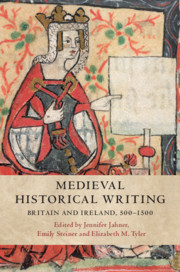Book contents
- Medieval Historical Writing
- Medieval Historical Writing
- Copyright page
- Contents
- Illustrations
- Notes on Contributors
- Abbreviations
- General Introduction
- Part I Time
- Part II Place
- Part III Practice
- Part IV Genre
- Chapter 22 Chronicle and Romance
- Chapter 23 Forgery as Historiography
- Chapter 24 Hagiography
- Chapter 25 Writing in the Tragic Mode
- Chapter 26 Crisis and Nation in Fourteenth-Century English Chronicles
- Chapter 27 Polemical History and the Wars of the Roses
- Bibliography
- Index
Chapter 22 - Chronicle and Romance
from Part IV - Genre
Published online by Cambridge University Press: 19 December 2019
- Medieval Historical Writing
- Medieval Historical Writing
- Copyright page
- Contents
- Illustrations
- Notes on Contributors
- Abbreviations
- General Introduction
- Part I Time
- Part II Place
- Part III Practice
- Part IV Genre
- Chapter 22 Chronicle and Romance
- Chapter 23 Forgery as Historiography
- Chapter 24 Hagiography
- Chapter 25 Writing in the Tragic Mode
- Chapter 26 Crisis and Nation in Fourteenth-Century English Chronicles
- Chapter 27 Polemical History and the Wars of the Roses
- Bibliography
- Index
Summary
This chapter examines the ways in which medieval romance acts to narrate history in late medieval culture. In this chapter I examine the role that the romance genre – often dismissed as merely entertaining tales of knights and giants, dragons and damsels – played as a mode of historical writing in medieval England. Romance can be understood as a mode of historical writing in medieval England through its widespread influence and lasting effects upon the material and textual history of the period. Adopted as a mode of historical rewriting of the past by the Norman and Angevin baronial classes, the narratives that it produced made their way from the pages of these early texts into chronicles and other historiographical genres such as genealogical rolls and civic memorials. They also had a lasting impact upon the terrain of England, in place names and origin stories for landmarks both manmade and natural, inscribing the local landscapes of memory with their histories. The importance of romance as a mode of narrating history should suggest that medieval historiography was a more flexible and encompassing practice than it is sometimes considered. History is not just confined to the pages of chronicles and universal histories, but is a malleable and flexible story that moves with ease between the oral, textual, and material cultures of medieval England.
- Type
- Chapter
- Information
- Medieval Historical WritingBritain and Ireland, 500–1500, pp. 389 - 403Publisher: Cambridge University PressPrint publication year: 2019



